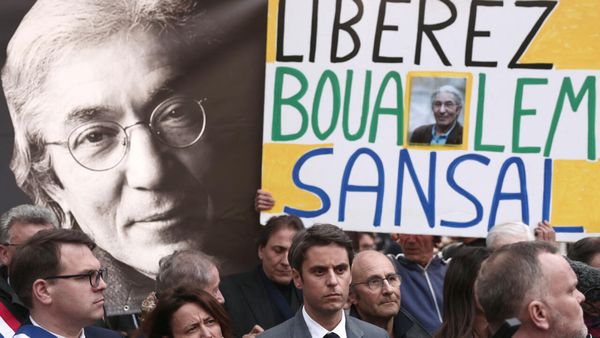
Since January 26, 1938, when more than 100 Aboriginal people gathered at Australia Hall in Sydney and declared it a Day of Mourning, it has been a powerful day of resistance and Indigenous community strength. Now known as Invasion Day, it belongs within a constellation of Aboriginal resistance efforts encompassing warfare, walk-offs, marches and quiet everyday resistances and refusals, beginning from first contacts and invasions of our lands and waters through to the present day. Each act is powerful and significant, calling for justice, land and life while defiantly reminding “we are still here”.
In 2024, Invasion Day is situated within a global movement that is reckoning with Israel’s occupation and genocide committed against the Palestinian people. It is also situated a mere 15 weeks after the failed Voice referendum that put Aboriginal lives and voices up for debate.
It has left most of us wondering: what will this colony do to us next? The failure of the referendum has emboldened racists and given licence to those who seek to divide — people who are already using it to further wedge the population, such as Peter Dutton.
Meanwhile those Black conservative careerists keep betting on white, and while they debate, while they divide, they climb their ladders on our communities’ backs as our people are still dying. We are all still suffering the psychic toll of the stark unveiling of this nation’s colonial core, with 13YARN, the national helpline for First Nations peoples reporting a more than 100% increase in support calls from people reporting abuse or trauma in the lead-up to the referendum.
We are still dying much younger than we should, with our old people rarely reaching retirement age and our young people dying preventable deaths. Far too many of our kids are still being stolen by the state.
Communities in north Queensland are facing devastating flooding, and others from the Kimberley to Northern Rivers are still rebuilding after being ravaged by other colonial environmental catastrophes. Extractive industries are still destroying our country, like the proposed seismic blasting in search for oil and gas reserves in the Otway Basin.
The state continues to sell what they call Crown land, as they’d rather have it in the hands of settlers and corporations instead of the mobs whose land it is. States and territories around the country are locking up more kids than ever, with no signs of slowing down. We experience all this in a social and political climate imbued with people saying the quiet racist part even louder.
Each year around this time, whingeing from patriotic sooks has become a pastime as the space for them to sizzle themselves like overcooked prawns comfortably in public, while waving their Aussie flags, becomes smaller. Each year the pageantry, parades and parties diminish.
This year, not content with having won the No vote in the referendum, they are rallying to boycott corporations such as Woolworths for no longer selling wasteful and (perhaps a greater sin) tacky Australia Day nationalist paraphernalia. While it may be heartening to think these companies are on the side of Blackfullas like us, just remember that there is no economic benefit to selling this shit, and they’re still a corporation price gouging during a cost-of-living crisis. Still, if nothing else, it is an aesthetic win.
What are we to do with all this when just a few months ago the nation resoundingly told us to go fuck ourselves? While the settler and the Black liberal political class hand-wring, wondering how their nation could have resoundingly rejected Blackfullas, there is work to be done.
We have always known what we need, and if this failed referendum has taught us anything, let it be this: we can’t wait for the goodwill of a settler nation. If the settler has been given the licence to be racist, we must give ourselves the licence to unrelentingly and unequivocally demand and fight for more than we ever have.
It was not that long ago people were asking for a change of date to celebrate Australia Day. It was the repeated demands of Blackfullas calling for it to be abolished that have ultimately won. We have successfully made the day too shame to celebrate. Want your mates and Instagram followers to know you’re a racist? Throw an Australia Day party. Each year we have limited the scope of the day as a celebration and pushed it further to the margins of cringe. This has been done by relentless annual organising by different mob around the country.
We know relentlessly demanding the seemingly impossible works. So what else can we achieve? What can we do when we refuse our political demands to be limited by a political class with narrow imaginations? What freedom and liberation lie on the other side? Reconciliation is dead, and so is recognition. What’s next?
This Invasion Day we demand:
- Treaty/Treaties
- Land back and land rights — stop selling land promised to us
- End Aboriginal deaths in custody and implement all the recommendations of the Royal Commission into Aboriginal Deaths in Custody and every coronial inquest
- Climate justice
- End the theft of Black children and return them to their family and kin
- Abolish police and prisons
- Reparations
We will march the streets again this January 26, and gather like our communities have on this day for 87 years. These streets have been well-worn recently, as every week tens of thousands have marched in solidarity with our Palestinian family being killed by both the Israeli state and settlers. Australia has consistently, albeit in varying degrees, supported Israel in its decades of occupation and violence, and as peoples subject to colonial forces and land theft, Blackfullas here are not surprised. As Palestinians have stood with us at our rallies and on Invasion Day, we continue to unwaveringly stand with them now, as we have in years before. We will continue to remind those people, those colonial state forces, “we are still here”, and we aren’t going anywhere.







